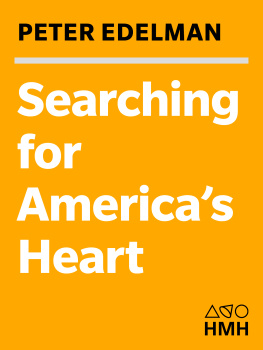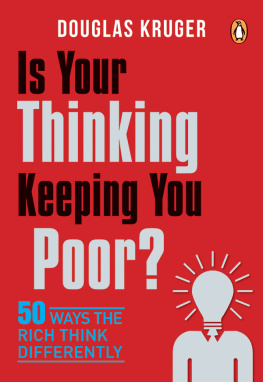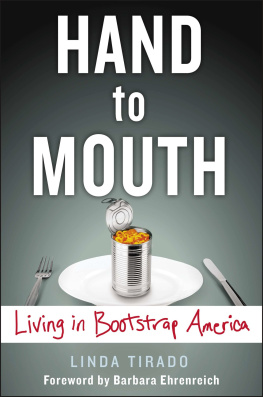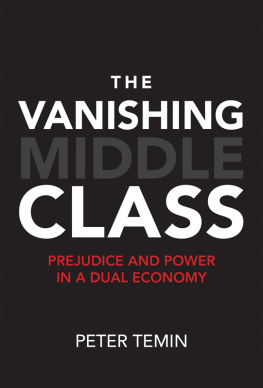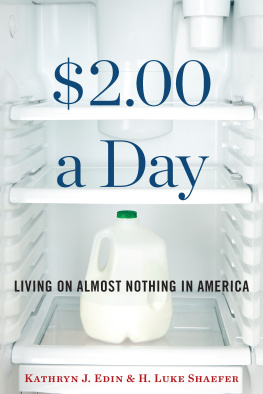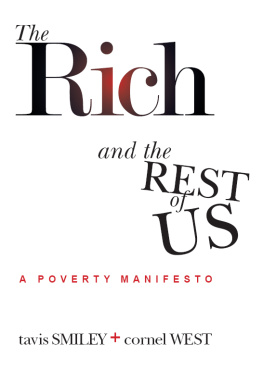SO RICH, SO POOR
ALSO BY PETER EDELMAN
Reconnecting Disadvantaged Young Men
(with Harry J. Holzer and Paul Offner)
Searching for Americas Heart: RFK and the Renewal of Hope
Adolescence and Poverty (co-edited with Joyce Ladner)
SO RICH, SO POOR
WHY ITS SO HARD TO END
POVERTY IN AMERICA
Peter Edelman

2012 by Peter Edelman
All rights reserved.
No part of this book may be reproduced, in any form, without written permission from the publisher.
Requests for permission to reproduce selections from this book should be mailed to:
Permissions Department, The New Press, 38 Greene Street, New York, NY 10013.
Published in the United States by The New Press, New York, 2012 Distributed by Perseus Distribution
LIBRARY OF CONGRESS CATALOGING-IN-PUBLICATION DATA
Edelman, Peter B.
So rich, so poor : why its so hard to end poverty in America / Peter Edelman.
p.cm.
Includes bibliographical references and index.
ISBN 978-1-5955-8804-3 (hc. : alk. paper)
1. PovertyUnited States. 2. United StatesSocial conditions21st century. 3. United StatesSocial policy21st century. 4. PoorGovernment policyUnited States. I. Title.
HC110.P6E34 2012
| 339.4'60973dc23 | 2011052784 |
Now in its twentieth year, The New Press publishes books that promote and enrich public discussion and understanding of the issues vital to our democracy and to a more equitable world. These books are made possible by the enthusiasm of our readers; the support of a committed group of donors, large and small; the collaboration of our many partners in the independent media and the not-for-profit sector; booksellers, who often hand-sell New Press books; librarians; and above all by our authors.
www.thenewpress.com
Composition by dix!
This book was set in Electra LT Std
2 4 6 8 10 9 7 5 3 1
For Ellika, Zoe, Levi, and Elijah
CONTENTS
I had the privilege of working for Robert Kennedy in the U.S. Senate nearly half a century ago. He was a man whoarguably unlike anybody at that level sincewas deeply committed to doing something very serious about poverty in this country and the intersection of poverty and race. I had the opportunity to travel the country with him, and to learn as he learned, by listening and talking to people and witnessing their struggles.
We met children suffering from extreme hunger in Mississippi and farmworkers struggling for a decent wage and the right to organize in the San Joaquin Valley of California. We worked with people pursuing community economic empowerment in the Bedford-Stuyvesant neighborhood of New York City, and we saw the enduring poverty of former coal miners striving against feudal local politics in eastern Kentucky. We encountered Native American children who had been shipped to white-run boarding schools thousands of miles from their homes and migrant farmworkers living in abandoned buses in upstate New York. I learned much more about what its like to be poor than I could have ever learned from books.
There must have been something in me all along. I grew up Jewish in the immediate aftermath of the Holocaust and in a Minneapolis that was very anti-Semitic. I was proud that my father was appointed by then-mayor Hubert Humphrey to the Human Relations Council that he created to address the prejudice against Jews and others. And I am sure that the Holocaust shaped my sense of the vulnerability of despised minorities.
After Kennedy died, I kept finding myself reconnecting to the issues I had learned about from him and with him, especially issues about young people who dont have a fair chance. Becoming a vice president of the University of Massachusetts in the early 1970s turned out to be an avenue from which to broaden opportunities for young people. Running the juvenile corrections agency under the newly elected governor of New York Hugh Carey continued the pattern. Joining the faculty at Georgetown Law Center allowed me to teach about poverty and offer my thoughts on the written page. Going to work with Donna Shalala in the Clinton administration was a chance to work on poverty-related issues. And when I resigned from the government in protest over President Clintons signing of the welfare law in 1996, the commitment became even more of a mission.
All along, one thing has led to another. What it adds up to is that for more than forty years I have been trying, in one way or another, to make some small difference toward reducing American poverty. Had I been part of the exodus from ancient Egypt, I would have made it to the promised land by now.
As things are, I am still at it. The purpose of this book is to look anew at why it is so hard to end American poverty and how we might do better. I write just now because poverty has steadily grown worse over the past decade, and it is more important than ever to place it on the front burner of our national concern.
I dont write with any feeling of futility. Of course, anyone who cares would wish that we had made more of a dent, but, as Ill explain, we have accomplished a lot. The idea that nothing works is a canard. The policy gains outweigh the policy losses by a considerable measure even with the recent deterioration of the situation. The problem is that the policy gains have been nullified by economic trends that eroded the earnings of millions while simultaneously enriching a super-elite whose wealth and income have reached unprecedented levels.
This cannot stand: America and poverty are words that should not appear in the same sentence. We are the wealthiest country in the world; that we should have poverty at all is oxymoronic, and that we have the highest child poverty rate in the industrialized world is downright shameful.
It is not because we are not a generous nation. Americans volunteer time and donate dollars enthusiastically. They help at homeless shelters and soup kitchens; they mentor and tutor low-income children; they fund scholarships; and on and on. We have a nonprofit sector that is unequaled in the world.
But at the moment public policy is another matter entirely. Liberal members of Congress say that, just now, approaching more conservative colleagues (and not just Republicans) with a proposition that contains the word poverty is an immediate red flag. Homeless veterans? Maybe. Poverty? No way. And welfarein the lexicon of many today, its a pejorative.
I thought the Great Recession might renew our commitment. I thought that poverty striking millions who had assumed they were economically secure might enlist their involvement in bringing about a politics of responsiveness and empathy that would include the already poor as well as the newly impoverished. It certainly seemed so at the beginning of the Obama administration.
President Barack Obamas stimulus legislation made a surprisingly large investment not only in extended and enlarged unemployment compensation and other help for the newly unemployed, but also in measures offering significant temporary support to those who had already been struggling before the recession began. There were temporary expansions of food stamps, increases in the Earned Income Tax Credit, the Child Tax Credit, augmented housing vouchers, more help for the homeless, added funding for Head Start and child care, and moreall of which cushioned the impact of the recession on those already poor and kept as many as 7 million additional people from falling into poverty.
Still, another 9 million more people fell into poverty between 2007 and 2010. The depth of the recession called for an even more extensive effort, but what was done was impressive nonetheless.


